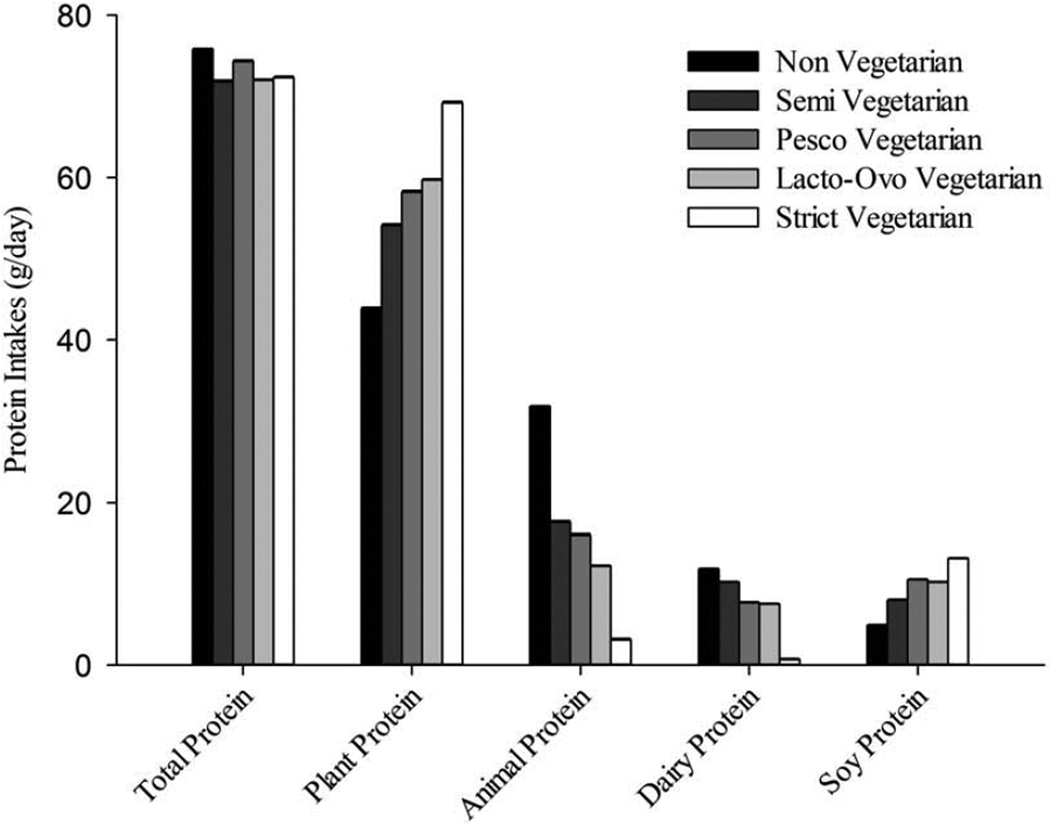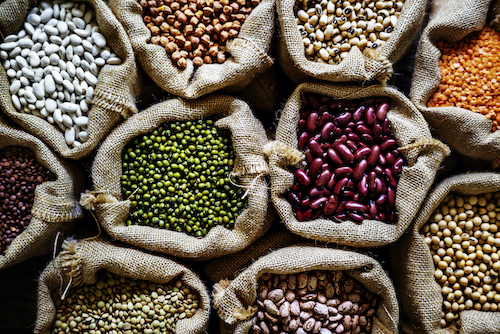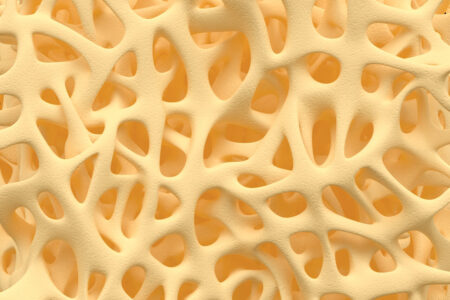Protein. Have you ever asked yourself, am I getting enough protein from my diet? Or am I eating too much? If you're a gym goer, a vegetarian, or a fan of any of the trendy protein-based eating styles, this question has surely crossed your mind at some point.
But perhaps more important than the quantity of proteins is their quality and where we get them? I'll write about what these proteins are, where they come from, and how much of them we need in a moment.
Proteins belong together fats and with carbohydrates are among the macronutrients that provide energy and are found in all cells. In other words, proteins are essential. Their main function is ensuring the growth, structure and development of the organismSometimes proteins are also called proteins, which is a loanword from English.
What is protein and where does it come from?
Complete protein
Are we deficient in protein and how much protein is too much?
Healthy sources of protein
What is protein and where does it come from?

To start from the very beginning, all nutrients come from either the sun or the soil. We get vitamin D from the sun, but everything else comes from the ground. Minerals come from the soil, and vitamins come from plants and microorganisms that grow in the soil.
For example, the calcium in cow's milk comes from the plants the cow ate, which in turn comes from the soil the plants grew in. In principle, it is possible to cut out the cow as the middleman and extract calcium directly from the plants.
Where do we get the proteins we need?
The main sources of protein are divided into two types, animal and plant sources. When researchers studied, how different eating styles affect the nutrient profile obtained, it turned out that quantitatively all the styles studied provided more or less the same amount of protein, including vegetarian food. However, the proportion of other nutrients differed between the different styles. This mainly depended on the consumption of milk and meat.
So there is no need to worry about the amount of protein for someone who eats their full energy needs and doesn't only eat ultra-processed junk.
But what about the quality?

Complete protein
There is a lot of talk about essential amino acids when it comes to proteins. Proteins are made up of amino acids, and some of them are so-called essential, meaning our bodies cannot synthesize them. So it is important that we get them from food.
The same goes for animals, they can't synthesize them either. All essential amino acids come from plants and microbes, so plant protein contains all the necessary amino acids.
The idea that plant protein is somehow inferior to animal protein originated almost a century ago from experiments on rats. Scientists discovered that baby rats didn't grow as fast on a plant-based diet. But baby rats don't grow as fast on breast milk either. Does this mean you shouldn't breastfeed your babies? Rat milk has ten times more protein than human milk, because rats grow about ten times faster than babies.
It is true that some plant proteins are relatively low in certain essential amino acids. This gave rise to the still-viable myth of combining plant proteins about 40 years ago. It suggested that we should eat complementary plant proteins together at one meal to ensure adequate amounts of essential amino acids.
Myths that plant proteins are not as complete and good as animal proteins or that they should be eaten together at the same meal combine with other proteins, have all been refuted by nutrition scientists decades ago, but obviously it takes time for this knowledge to spread through society and the myths are tenacious.
Amino acid stores and protein recycling
It turns out that our bodies aren't stupid. Our bodies keep reserves of free amino acids, which can do the combining with other proteins for us if necessary. So if the body doesn't get all the essential amino acids in sufficient quantities in one meal, it has a backup plan for that situation.
In addition to the free amino acid supply, the body also processes proteins. Every day, the body sends about 90g of protein back to the digestive system to be broken down into amino acids again. This is quite a lot, considering that the average daily protein requirement for a person weighing 60kg is 39g.
Thus, our body is able to synthesize new proteins from dietary proteins, free amino acids, and old proteins exactly as we need them at the moment.
Dr. John McDougall writes that based on research and simple mathematics, it is safe to say that it is impossible to put together a plant-based menu that meets our energy needs but does not provide enough protein, including essential amino acids.
He adds, “A plant-based diet that includes at least one starchy food (e.g., potatoes, rice, corn, beans), combined with other vegetables and fruits, provides all the necessary proteins, amino acids, fatty acids, minerals, and vitamins (except vitamin B12) needed for good health. It is false to suggest that people should eat animal protein to get their nutrients. This encourages them to eat foods that are known to contribute to heart disease, diabetes, obesity, and many forms of cancer, to name a few.”
Are we deficient in protein and how much protein is too much?

A comprehensive meta-analysis that examined everything published so far nitrogen balance Studies to refine the protein intake recommendations given by the WHO in 2007 found that the protein requirement (median) for an adult (men and women of all ages) is 0.65g per day for every kilogram of healthy body weight (i.e. ideal weight). Since this is the median, half of people have a need slightly less than this and half a little more.
If you don't know exactly what your protein needs are, how much protein should you be eating? The study suggests that the individual safe upper limit is 0.83g per kilogram of normal body weight per day, and the general population safe upper limit for protein intake is 1.05g per kilogram of normal body weight per day. No one needs to eat more than that.
This study also shows that very high protein intakes, exceeding the safe upper limit by 3-4 times, are not risk-free. In other words, it should be remembered that this 0.83 g/kg per day is a safe upper limit, the actual protein requirement is usually between 0.5 and 0.8 g per kilogram of normal weight per day.
Protein deficiency is not the problem, but rather excessive consumption
There are other things to do in life than constantly monitoring what and how much you eat. How likely is it to eat too little or too much protein?
Population studies in Estonia and other developed countries show that protein, especially animal protein, is consumed significantly more than is needed. Less than 31% of the population is protein deficient, and it is difficult to exceed this safe upper limit of 3 or 4 times with a regular diet.
So, good news for everyone, you don't have to worry too much about protein intake if you get your daily energy needs from food and don't follow a specific protein-based diet plan.
Protein deficiency is associated with loss of muscle mass, lack of energy, and a weakened immune system.
Long-term overconsumption of protein puts a strain on the body, especially the liver and kidneys, and is associated with various health risks. It is especially dangerous to eat too much animal protein, including meat, fish, eggs, and dairy products, because they also contain a lot of saturated fatty acids.
If the amount of protein is not usually an issue, what about different protein sources?
Healthy sources of protein

Is there a difference between protein from animal and plant sources? The short answer is yes and no. There is no difference in the sense that the amino acids that make up proteins are the same regardless of whether we get them from animal or plant sources.
The difference is in the “packaging.” Animal protein comes with saturated fats, cholesterol, sodium, and other undesirable components. Plant protein, on the other hand, comes with phytonutrients, fiber, and other components that support our health.
Additionally, omnivores tend to consume too much animal protein and too little plant protein, which places a greater burden on the kidneys to rid the body of excess nitrogen.
Consuming plant protein has disease-preventive effectBy getting your protein from beans, nuts, seeds, etc., while reducing your intake of refined carbohydrates, you reduce your risk of heart disease.
In a more recent one Harvard researchers found in a study, that “replacing animal protein from a variety of sources with plant protein is associated with lower mortality.”
Health risks associated with animal protein
Therefore, consuming animal protein poses several health risks, both to the consumer and to others. Namely, it has been found that animal protein consumed during pregnancy affects the child's fat metabolism, increasing the chance that the child will be overweight 20 years later.
While plant protein reduces the risk of heart disease, animal protein consumption actually increases it. The researchers examined the effects of both the quantity and quality of protein consumed. to the development of coronary heart disease and found that the amount of protein consumed had no effect. However, the source of the protein was important. A higher proportion of plant protein kept the disease at bay, and a higher proportion of animal protein increased the risk that the disease would end in death.
Proteins – Summary
If you don't starve yourself, i.e. eat the required amount of energy every day and don't eat only fruit, then you shouldn't have a protein deficiency. Also, nothing bad will happen if you exceed your daily requirement by two times. Problems start to arise with very large amounts of protein, if you exceed the safe upper limit by 3-4 times.
The source of protein is more important than the amount of protein. The amino acids in plant protein are just as good as those in animal protein. However, plant protein comes in a “package” with healthy nutrients, while animal protein comes with problematic nutrients.

Allan Randlepp
NutritionistAllan is a nutritionist and trainer whose favorite topics are lifestyle and longevity, including nutrition and physical activity.
Lifestyle training "Creation and health - weight loss special"





